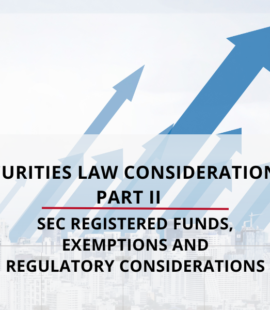Securities Law Considerations Part 2: SEC Registered Funds, Exemptions and Regulatory Considerations
The Investment Company Act of 1940, as amended (“40 Act”) defines an “investment company” as an issuer primarily involved in the business of investing, reinvesting, or trading securities. It explicitly prohibits any engagement in buying and selling securities without SEC registration or a valid exemption. Hedge funds and comparable pooled investment vehicles fall under this definition if they meet one of the two exemptions.… Read More



